Duke Divinity Alumni Embrace Ministry during a Pandemic
2020 Graduates Demonstrate Faithfulness and CreativityBy Stephanie Hunt
Photography by Les Todd and Amelia Cassar
“Imagine the world as you have known it has ceased to be. Imagine that the logic with which you approached your life now no longer seems to hold. Imagine that a hope in a bright future is now called acutely into question, if not seemingly demolished altogether.”
So suggested Duke Divinity School’s Sujin Pak, then associate professor of the history of Christianity and vice dean of academic affairs, as she offered the first-ever virtual sermon for the first-ever Senior Cross Service to be live-steamed from an empty Goodson Chapel. In May of 2020, seniors listened to Professor Pak via their laptops or iPhones. Later they picked up their beautiful glass crosses via a socially distanced handoff from Chaplain Meghan Benson’s home driveway—a makeshift “ceremony” that seemed part lemonade stand, part tender and joyful COVID pivot.
For a graduating class departing Duke Divinity School at the height of a global pandemic, this was yet another first no one wanted to be first for. As Pak noted, the world as they had known it had, indeed, ceased to be. Their hope for a bright future was fraught and questionable. Fittingly, the color of the 2020 senior crosses was a moody blue.
But graduate they did, the class of 2020, entering into ministries of various callings in a time without modern precedent. Somewhere between the start of their final spring semester and graduation, the playbooks all changed. Classes went online; pews were now empty; nonprofits shuttered or at least radically shifted. By this point in their final year, the class of 2020 knew well that being a divinity student involved confronting deep questions, but the post-graduation questions facing them were deeper and more daunting than any expected. What does it mean to pastor when the flock is far afield? How does a newly minted minister learn the ropes when ropes are now cordoning off everything?
Pandemic or not, every journey into ministry is personal and unique and brings with it distinct challenges and rewards. Those who crossed this threshold in the midst of COVID-19 and during a period of intense racial unrest and heightened political divide experienced God’s presence in truly unique ways: amid masked and anxious congregations; in full PPE beside ICU patients; in the throes of technology marvels and YouTube conundrums. They struggled to find ways to share God’s love during lockdown, and their lessons learned hold insights for all called to bear witness during uncertain times. Here we introduce five graduates of the class of 2020 and their stories of this unexpected journey.
“Ministry has to be fluid and adaptable to today’s context. That doesn’t mean we compromised doctrinal beliefs, but we can embrace new methods.”
– ORLANDER THOMAS
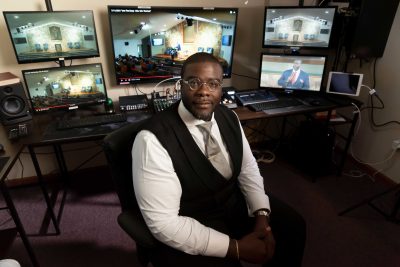
“Ministry has to be fluid and adaptable to today’s context. That doesn’t mean we compromised doctrinal beliefs, but we can embrace new methods.”
– ORLANDER THOMAS
UNDOING HOW WE DO CHURCH
Orlander Thomas’ big baritone voice is what you’d expect from a man of such big, jovial presence—and it’s no match for a mask. That voice resonated strong and hopeful from the pulpit of Durham’s Southside Church of Christ throughout the spring of 2020, despite the fact that no one was there to hear it. That’s thanks to a mix of prescience and God’s providence, according to Thomas, a Durham native who “had ministry stops” in California and Florida before he and his wife and three young children returned to his hometown in 2015 to be closer to family, and, he hoped, to attend Duke Divinity School. After being accepted into the M.Div. program in 2016, Southside, the church Thomas had joined as a teenager, welcomed him back as student pastor and associate minister. One of his first initiatives was evaluating the church’s technology.
“For the last four years, our IT guy and I had been talking about what the tech future might hold and dreaming about how to capitalize on that for Southside,” says Thomas, an “iPad preacher” often frustrated by unreliable internet connections. He worked with the church’s finance and leadership teams to upgrade the internet service and shift to Microsoft platforms.
“I believe everything we need in the economy of the kingdom is here,” he says. “But little did I know how vital it would be when, in March 2020, we went from a full house one Sunday to figuring out how to set up my cellphone on a tripod for Facebook Live two Sundays later.” Quickly the church invested in professional cameras, and soon Thomas’ booming and assuring voice was broadcast loudly and clearly to Southside’s Facebook and YouTube subscribers.
As the pandemic was “changing life as we knew it,” according to Thomas, his role was also changing and expanding. He had been promoted to co-pastor in 2017, serving in the pulpit throughout his studies at Duke; then in August 2020, Southside’s long-time senior pastor retired. “He said he’d always asked God to tell him when it was time, and now with COVID here, the way we do church had to totally change. That was exhausting for a 73-year-old winding down 38 years in ministry.” Thomas, however, was energized, embracing the new challenges, both logistically and theologically.
“Our tradition is literalist to some degree, so change can be problematic,” he explains, noting some members worried that Hebrews 10:25 (“do not forsake the assembly of ourselves together”) invalidated virtual worship. “My response was that things are available to us today that weren’t available to the first-century church. Thank God for books and Kindles; that we’re not opening up long scrolls anymore! Let’s not shun advances that can aid worship,” says Thomas, who was officially installed as Southside’s new senior pastor in July 2021.
Under his leadership during the pandemic, giving has increased by at least 15 percent, the 425-person membership has grown by 10 percent, and the church has undergone a $40,000 renovation, including technology equipment. Southside’s YouTube channel launched in late March 2020 with 100 subscribers; today there are 1,200. But that growth hasn’t come easily. “There is more work to do today than before the pandemic, so much that you have to make up for when we aren’t seeing see one another weekly,” Thomas says. He implemented a monthly CORE report (connectivity, observation, reporting, engagement) with his ministry team to help “keep a pulse on the congregation. Our number one job is to connect,” he adds.
Such intense on-the-job learning and adapting while simultaneously studying at Duke showed Thomas that there is hope and promise in the unexpected. “At this time when Christianity is declining in this country, the pandemic has radically changed how we do church. People no longer take worship for granted. I’m seeing more people invigorated in their faith. It’s a glimmer in the darkness,” he says.
“Ministry has to be fluid and adaptable to today’s context. That doesn’t mean we compromised doctrinal beliefs, but we can embrace new methods.”
“I believe this confluence of the pandemic, George Floyd’s murder, and the political reckoning in our country has helped us move past the small talk and will continue to help the church become who it’s supposed to be. I hope that will be my work.”
–ALICE GRAHAM GRANT
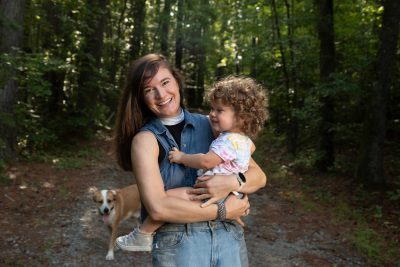
“I believe this confluence of the pandemic, George Floyd’s murder, and the political reckoning in our country has helped us move past the small talk and will continue to help the church become who it’s supposed to be. I hope that will be my work.”
–ALICE GRAHAM GRANT
ENORMITY OF GOD’S GRACE
“It’s a perfect time to be in ministry,” affirms Alice Graham Grant, who earned a studio art degree from Davidson College and worked in finance before exploring ministry at Duke. She’s thoughtful, carefully measuring her words, and as you might expect of someone who enjoys painting abstract wildlife images and playing ice hockey, she’s both keenly observant and ready for action. “I believe this confluence of the pandemic, George Floyd’s murder, and the political reckoning in our country has helped us move past the small talk and will continue to help the church become who it’s supposed to be,” she says. “I hope that will be my work.”
Grant’s initial work after her “graduation that never happened” was a hospital chaplaincy rotation. “It was the height of the pandemic, when no hospital visitors were allowed, which meant chaplains worked overtime,” says Grant, a transitional deacon preparing for ordination in the Episcopal Church. As a chaplain, Grant was grateful to be present with people in some of their “most holy moments,” but she also had a nursing infant at home, and the combination of new motherhood and pandemic chaplaincy required her to draw on the scope of all she’d learned as an M.Div. student in a concentrated, intense period of time.
“I was especially grateful that Duke had taught me so much about the importance of prayer,” she says. Even so, she often found herself stretched thin, unable to pray with and for every patient. The level of suffering around her at times was overwhelming. “I learned to trust that God’s mercy was present regardless; it wasn’t dependent on me,” Grant says. “Understanding the enormity of God’s grace is what I walked away with, and what I hope I’ll carry forth.”
After completing her chaplaincy, Grant returned to parish ministry as curate of The Advocate, a small Episcopal mission in Chapel Hill. There she found more balance between joys and sorrows, “more of the totality of life,” she says, including celebrations of births and baptisms. She welcomed the “cerebral spaces” of preparing for sermons and teaching. But the cloud of COVID-19 along with the political and racial turmoil of that summer and fall underscored Grant’s realization that parish leadership demands speaking out and action.
“When there’s a crisis like George Floyd’s murder, people look to those of us in ministry. Sometimes it seems that words won’t suffice, but I think, as a white person, it is unacceptable to not have something to say, to lead people,” she adds. Nor are words alone enough, she believes, or even prayer and self-study. “A book study is a great place to start, but we can’t read or study our way into meaningful change or justice,” says Grant. “Jesus said ‘Blessed are the peacemakers,’ not the peace-lovers! Change has to come from collective, risky action.”
For Grant, entering parish life during the crescendo of simultaneous crises without the ability to process them in community was particularly challenging. “It’s not God’s design for us to be figuring this out home alone, with only Facebook’s algorithm to lean on,” she says. While worship and church activities returned to a semblance of normal this past summer, Grant is unsure what the fall holds as she moves into a new role as associate rector at St. Paul’s Episcopal Church in Cary, a much larger congregation. But as she learned throughout 2020, being ready, attentive, and responsive to whatever comes is part of the work.
“You can’t prepare for the world to suddenly turn sideways the way it did, but there is precedent in the Scriptures,” she says, noting lessons gleaned from Ellen Davis’ Old Testament class, among other classes. “Divinity School was a step along the journey, but it’s not like once you graduate, everything is tied in a bow and you’re somehow ready to go,” Grant says. “Duke gave me a curiosity to keep asking questions and helped me develop a willingness to adapt to the demands of ministry and of the Holy Spirit. I hope I never get to a point where I think I know it all.”
“Thankfully God was constantly giving me the language and rhetoric I needed. I reminded folks that political office is temporary but our citizenship in heaven is not.”
– IAN BAILEY
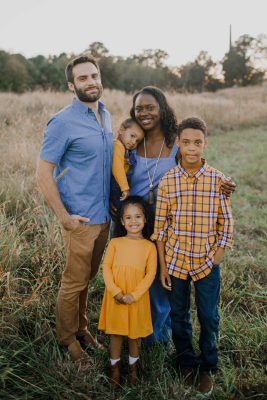
“Thankfully God was constantly giving me the language and rhetoric I needed. I reminded folks that political office is temporary but our citizenship in heaven is not.”
– IAN BAILEY
CARPOOL KARAOKE AND A GOLD MICROPHONE
Ian Bailey took a few extra laps around the field before falling in line as a fifth-generation United Methodist minister. His father is a retired district superintendent in the Western North Carolina Conference, and thus church was ever-present when he was growing up. But Bailey loved football. “I thought I’d be the next Peyton Manning,” the former Division 3 college football player muses.
After college, Bailey pursued sports marketing, landing an internship with the Washington Redskins (now the Washington Football Team). It was all an effort to outrun presumed expectations. “People would assume that as a preacher’s kid, I didn’t know how to have fun, so I always challenged that,” he says. This mindset extended to his early professional life, which he opted to make “as secular as possible.”
Yet several years into a lucrative advertising and sales career, “I felt empty,” Bailey admits. When he could no longer deny a pull toward ministry, he applied to seminary. “I took the round-about way of finding my own calling in my organic way,” he says, and when this die-hard Tarheel fan was accepted to Duke Divinity School, he jokes that he “knew God was real.”
At Duke Bailey sought solid theological grounding for his faith. He appreciated how the Divinity faculty balanced teaching traditional church doctrine with an inclusiveness to other faiths. The only thing lacking? “A class on how to lead a congregation through a pandemic,” he jokes. Serving as a student pastor for a rural congregation in Rougemont, N.C., however, helped take up that slack. “You can do practice drills all you want, but you really learn when you play the game,” says the sports enthusiast.
At Rougemont UMC, Bailey honed his agility. When in-person worship halted, he went to Best Buy and spent $40 on a carpool karaoke machine with a gold microphone. “It was so tacky! But I had this vision for a drive-in experiment, making an amphitheater. My wife has a gifted singing voice, so we played music and held worship while people at the gas station next door pumped gas,” Bailey notes. “It was fun. A good way to evangelize.”
In June 2020, one month after graduation, Bailey was named senior pastor at Merritt’s Chapel UMC near Lake Jordan, on the outskirts of Chapel Hill. Due to COVID, there was no traditional big church supper to welcome the new minister and his family, no shaking of hands or glad-you’re- here hugs. Instead, he stood on the corner and waved as church members drove by. “They honked their horns and found out how interactive drive-in church can be,” Bailey says.
In his first months, he and the church’s sound and audio person worked to reach people in creative ways: drive-in with FM-radio transmission, online internet streaming, mailing out sermons to members in nursing homes. “We tried every single way we could to be physically, spiritually, socially connected,” Bailey says.
As Black Lives Matter protests and the 2020 presidential campaign heated up, Bailey, whose wife is Black, was mindful that his biracial family might look different from most other families in rural areas. But he didn’t flinch. “In general, we oppose racism through our sheer presence in restaurants, neighborhoods, shopping malls, etc. Hearts can change. And we have experienced nothing but the love of Christ with the people at Merritt’s Chapel United Methodist,” adds Bailey.
Nonetheless, pastoring a politically divided congregation during a contentious election season was challenging. “Thankfully God was constantly giving me the language and rhetoric I needed. I reminded folks that political office is temporary but our citizenship in heaven is not.”
Between a dangerous virus and heated politics, Bailey realized that to pastor through a pandemic means “loving your neighbor as yourself, while being safe, wise, and faithful,” he says. “We want to spread the Good News, not the coronavirus. To balance all these things is the art of pastoring during COVID-19. Thankfully, Duke gave me the background to parse this all out.”
“It was so important to keep people connected, to let them know they are not alone. Church is community. As a chaplain, and as a congregational care director, my job is to gently help others recognize where God is showing up, and I believe that God is always showing up.”
– CATHERINE NEAL
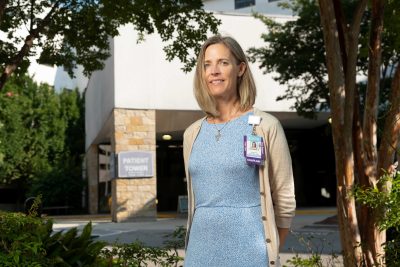
“It was so important to keep people connected, to let them know they are not alone. Church is community. As a chaplain, and as a congregational care director, my job is to gently help others recognize where God is showing up, and I believe that God is always showing up.”
– CATHERINE NEAL
HONORING THE QUESTIONS
Engineers are problem solvers. They are trained to find elegant solutions to complex equations, at which Catherine Neal excelled. The Virginia native holds a master’s degree in engineering and worked as a software engineer in San Francisco, then on a spy satellite program for Lockheed Martin, before finding herself in a Duke Divinity theology class, where tidy answers were few and far between. “Divinity School helped me hold the questions, and be comfortable with not having answers. For an engineer, that was really disorienting,” says Neal, who finished her master of arts in Christian practice (M.A.) degree in September 2019, right before COVID hit.
“I’ve always been a person of faith and active in church life,” says Neal. While living in San Francisco, she volunteered to visit hospitalized church members in her spare time and found it rewarding. “I felt a tug that chaplaincy might be my calling, but I wasn’t sure,” says Neal, a deacon in the United Methodist Church and mom of two teenagers. “Chaplaincy isn’t something you can just walk into without training, so that’s why I came to Duke. To discern.”
Neal loved the tight-knit M.A. program and the support, wisdom, and care she found in her discernment group. The opportunity to process her ministry path with her Duke spiritual partner helped deepen and affirm her sense of pastoral authority, she says. “From day one, Todd Mayberry and others told us, ‘you are here to be formed, to be transformed’—that shift from head to heart. As an engineer, I was prepared for the academics, but I didn’t expect so much of the spiritual formation.”
Nor when she envisioned chaplaincy did she expect that a pandemic would envelop the hospital. Neal completed the second of her two clinical pastoral education (CPE) rotations at UNC REX Hospital, where she now works part-time as a chaplain. Praying alongside COVID patients, many of whom were “truly in the valley of the shadow of death” with no family there to comfort them, was an honor, according to Neal. It helped deepen her understanding of a central tenet of the Methodist deacon’s role, “to have compassion, which means ‘to suffer with,’” she says. “I felt this remarkable peace going into rooms and sitting with people who were suffering deeply.” But wearing masks and full PPE made it challenging—“It was hard to express emotion; there’s only so much you can do with your eyes,” she adds.
In addition to her chaplain role, Neal serves as congregational care director at Christ UMC in Chapel Hill, where again, the pandemic made the job more demanding and stressful. During the height of COVID, Neal spent a lot of time on the phone, reaching out to older members of the church who had no computer or DVD player.
“It was so important to keep people connected, to let them know they are not alone. Church is community,” she says. “As a chaplain, and as a congregational care director, my job is to gently help others recognize where God is showing up, and I believe that God is always showing up.”
Entering into ministry during the pandemic affirmed for Neal, who lost her mother during COVID, how vital relationships are, specifically in discipleship. “The pandemic helped me discern what I needed to give up in order to be still, ‘to be still and know that I am God’—that kind of stillness,” she says. “At Duke, especially with my discernment cluster, my eyes and heart were opened up, my heart transformed, my mind expanded. I had, and still have, so many questions. And I’m OK with that.”
“This is the path God was leading me to, this need for multicultural ministry and expanding multicultural environments for worship. My cultural background allows me to serve as a bridge.”
– SAUL GASTELUM
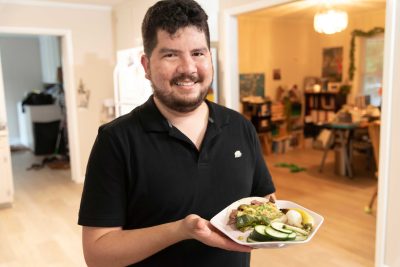
“This is the path God was leading me to, this need for multicultural ministry and expanding multicultural environments for worship. My cultural background allows me to serve as a bridge.”
– SAUL GASTELUM
GOD’S LANGUAGE OF LOVE
During his final semester at Duke Divinity School, Saul Gastelum was extra careful. One of his housemates had underlying health conditions and was at high risk for COVID-19, so even when fellow classmates planned a small, outdoors, socially distanced graduation celebration, he declined.
A few weeks later in June 2020, when Gastelum moved to Holly Ridge, a small town in eastern North Carolina, to begin his first church appointment at the EDGE Church (UMC), he found a very different situation.
“On my first Sunday, worship was in-person, with no masks, no social distancing. I’d been so cautious in Durham, and now this was the opposite extreme,” he says. Suddenly he’d landed in a community where prevailing ideologies valued personal freedoms over public health, and this newly minted senior pastor was unsure how to handle it.
“I wish I’d taken Pandemic 101 in seminary,” laughs the affable native of Sonora, Mexico. “But actually, I felt prepared in terms of pastoral care and ministering to my congregation during COVID, but I wasn’t prepared to handle the political divide.” Being a Mexican pastor in a conservative, military, predominantly white town didn’t help matters, adds Gastelum, who missed the comfort of having good ethnic and Mexican food nearby.
He struggled with how to follow CDC guidelines for his own safety and for others (“as an immigrant clergy person I need to follow the rules,” he says), and with how to speak about general current events, including the pandemic, without seeming political.
“My biggest challenge as I entered ministry in 2020 was learning how to serve my congregation in a polarized environment,” he says. “To love and care for people who don’t share my way of seeing the world, and be able to serve them and create relationships so together we can better serve our community and our God.” Like his fellow 2020 classmates, he too mastered the art of online worship, though as a former software developer, technology hurdles weren’t an issue. Regardless, the majority of his small congregation insisted on maintaining in-person options, so Gastelum got tested frequently and tried to be as safe as he could. His parents, both ordained Assembly of God pastors in Mexico, called daily to check on him.
Gastelum’s journey to Duke had been an unlikely one. As the son of ministers, he’d grown up in the church and always had a heart for church service, even as he advanced in his technology career. He thought bivocational ministry would be his path, “but I’m the type of person who gives 100 percent to what I do,” he says.
Trying to juggle both software engineering and ministry meant 12-hour days, which soon exhausted him. He decided to take a year off to listen for God’s guidance and volunteered at a Methodist youth camp in Michigan, where he met a retired professor from Duke Divinity School. Gastelum had never heard of Duke, but soon visited, applied, and was accepted. Throughout his M.Div. studies, he wasn’t sure if he’d eventually return to serve in Mexico or stay in the States, but his experience at the EDGE Church during the tumult of 2020 has affirmed his calling to minister among those of different backgrounds. In June 2021, Gastelum became assistant minister of Holland’s UMC in Raleigh, where he will do just that.
“This is the path God was leading me to, this need for multicultural ministry and expanding multicultural environments for worship. My cultural background allows me to serve as a bridge,” he says. “God’s invitation is to join his language of love in spite of my own limitations and prejudices. Language and heritage might be a limitation for those who speak or know only one, but the language of love in the Holy Spirit has no limits. That is the language I hope to help others learn to speak fluently.”